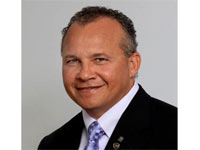
Leading Realtor® Mario Carey today applauded a call by the Bahamas Real Estate Association (BREA) urging government to reduce stamp tax by 2% across the board, a recommendation he made publicly in May following the newly-elected government’s announcement it would lower stamp tax on sales of high-end properties.
“As an organisation, BREA represents more than 500 brokers, agents and associates so when BREA urges action, it is a powerful statement that is neither reached lightly nor spoken without a lot of forethought,” said Carey, founder of Mario Carey Realty.
Carey had attempted earlier to rally other voices in the call for a reduction of stamp tax, the one-time fee paid at the time a property is sold, but without success. He gambled and went out on his own, a sole voice publicly calling for the broader cut after government announced it would reduce the tax from 12% to 10% on properties valued at over $250,000. Under the revised act that reduced the high-end tax as of July 1, 4% is imposed on sales of property valued at $20,000 or less, 5% on property valued between $20,001 and $50,000 and 8% on property valued between $50,001 and $100,000.
In mid-May, when he first called for the across-the-board reduction in the sliding scale fee that had been imposed to generate revenue, Carey cited the ongoing economic benefits of property purchases, particularly for residential purposes.
“It’s great that government has announced its intentions to roll back the stamp tax on high end properties from 12% to 10%,” said Carey.
“That move will make The Bahamas more competitive in the luxury market, which is important, but I encourage government to go further and reduce all stamp tax on residential transactions by 2% to give middle income families the same advantage and incentive as high-end purchasers. The economic benefits are almost incalculable.
“Take the example of a young couple buying a lot. They have plans drawn for a house so that is business for an architect. Government benefits from building permit application fees. A contractor is hired. Construction begins. That’s work for carpenters, electricians, plumber, tile layers, skilled and unskilled labourers, painters, landscaping. And that’s just the beginning. Once the home is built, the couple moves in and they need furniture, have ongoing maintenance, improvements, maybe staff. Studies have repeatedly shown that ownership of a single residence generates three full-time jobs, enhances a sense of community and responsibility and is a boost to economic health.”
Conversely, according to Carey, a desultory real estate market is the first sign of a struggling economy and it is not until real estate picks up that economic recovery becomes reality. He is quick to point out that the ability of banks to make credit available at affordable and competitive terms also plays a vital role in recovery.
“Long before empty bellies make stealing food a reality,” he said, “you see signs of a lackluster market with more for sale signs than moving trucks pulling in, with the number of foreclosures growing and the demand for short-term rentals increasing.”
Carey is in the process of forming a Bahamas real estate advisory group (BRAG),made up of economists, real estate professionals, legal experts and visiting or rotating international advisors, an organization he suggests that would have high-level round table discussions on the current economic crisis with a focus on the real estate sector.
“There are so many opportunities using a variety of economic policies and tools that can be used immediately and planned for future generations of owners and I don’t think we have begun to explore many of those within our reach,” he said. “But affordable stamp tax, building materials duties and property taxes would open up a world that is just out there waiting to be tapped into and developed in a way that is friendly to the environment, helpful to the economy and beneficial to the social well-being of a community.”
Diane Phillips and Associates


